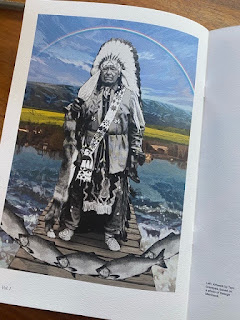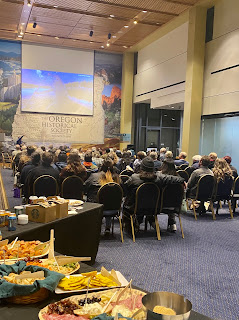[Lily Hart is the Digital Manager at the nonprofit Confluence and coordinator of the Voices of the River Journal. She is also a first year PhD student at the University of British Columbia.]
[Voices of The River Journal cover and interior art, both by Tommy Greeyes.]
Last night, I celebrated the launch of a new journal
focused on the history, living culture, and ecology of the Columbia River
system, through Indigenous perspectives. Voices of the River is an accessible journal of stories, research papers, poetry, and art designed to elevate Indigenous perspectives in our understanding of our region—the greater Columbia River system—and our nation. As the Digital Content Manager at the publisher, the nonprofit Confluence, I have had the honor of acting as the managing editor for this publication.
Confluence is a community supported nonprofit that
connects people to the history, living cultures, and ecology of the Columbia
River system through Indigenous voices. Wework through five completed art
landscapes, educational programs, and public gatherings in collaboration with
northwest tribes, communities, and the celebrated artist Maya Lin. You can find
more about us and our history here. This project is an extension of our work in public gatherings, education programs in schools, and our Digital Library, which features interviews, documentary shorts, photo galleries, and research papers on various subjects exclusively from Indigenous perspectives.
This 30-page journal
is supported by a generous grant from the National Endowment for the
Humanities. It features articles by the authors pictured above from left to
right: Rachel Cushman (Chinook) and Chance White Eyes (Oneida), Sean Smith
(Chinook), and Emily Washines (Yakama). The Journal also includes works by
Carlee Wilson (Chinook), poetry by Ed Edmo (Shoshone-Bannock), and first-person
narratives from Linda Meanus (Warm Springs/Celilo) and Confluence Founding
Board Chair Antone Minthorn (CTUIR), with accompanying art by Tommy Greyeyes
(Navajo). For me, it has been such a pleasure to work with the authors of all
these pieces, as well as the graphic artist Tommy Greyeyes.
Confluence recognizes that the idea of “peer review” is part of the Western academy, which as it has been shown time and again, is part of upholding imperial goals.1 While some of the articles (research intensive) in the Confluence Journal, are technically categorized as “peer reviewed” for the purpose of qualifying as a academic journal we attempt a decolonial approach to the process..
In this spirit, Confluence aimed for the process of what is called “peer review” to be a positive one, aimed at helping the author improve the article and helping the editor make edits, rather than subject an author to many many rounds of revisions or act as a gate-keeping mechanism. One of the ways I saw this emerge was through the thoughtful engagement authors had with each other’s articles. We held meetings with all the authors together, so they could give each other feedback and build community along the way. I just sat back and watched them engage with each other—thoughtfully and creatively.
The Michi Saagiig Nishnaabeg scholar Leanne Simpson writes of “Aanjigone,” the Nishnaabe concept “that one needs to be very, very careful with making judgments and with the act of criticism. Aanjigone is a concept that promotes the framing of Nishnaabeg values and ethics in the positive.”2 This idea is what frames Simpson’s approach to writing and academia.
Simpson writes that:
“Critique and revelation cannot in and of themselves create the kinds of magnificent change our people are looking for...To me it means we need to be careful with our criticism. We should not blindly follow the academy's love affair with criticism, ripping apart other Indigenous academics' work-with whom we probably have more in common than virtually any other academics in the world. Instead, we should highlight the positive within each other's work, and save our criticism for the forces that continually try to rip us apart.”3
On Friday, November 18th, the journal officially launched with a party at the Oregon Historical Society. We held a panel with four of the authors—Rachel Cushman, Chance White Eyes, Sean Smith and Emily Washines—mingled, and sold journals. The journal can be purchased here. This was the first time some of us met in person, and a moving culmination of almost a year's work.
[Top: Left to right: Confluence Digital Content Manager Lily Hart, author Emily Washines (Yakama), author Sean Smith (Chinook), poet Ed Edmo (Shoshone-Bannock),,author Rachel Cushman (Chinook), author Chance White Eyes (Oneida), and Confluence Executive Director Colin Fogarty. Bottom: Launch party at the Oregon Historical Society. Attendees joined for food, mingling, and a panel featuring Rachel Cushman, Chance White Eyes, Sean Smith, Emily Washines, and moderated by Lily Hart.]
1. Linda Tuhiwai Smith, Decolonizing Methodologies:Research and Indigenous Peoples (London, UK: Zed Books, 2012).
[Holiday series starts Monday,
Ben
PS. What
do you think?]





No comments:
Post a Comment